In an airport. Waiting for her luggage – which appears to have taken the Slow Boat to China while she was on a Boeing 777. To fend off boredom, she inventoried the highs and lows of her theatre-going escapades since you last encountered her at the 2017 San Francisco Ballet gala.
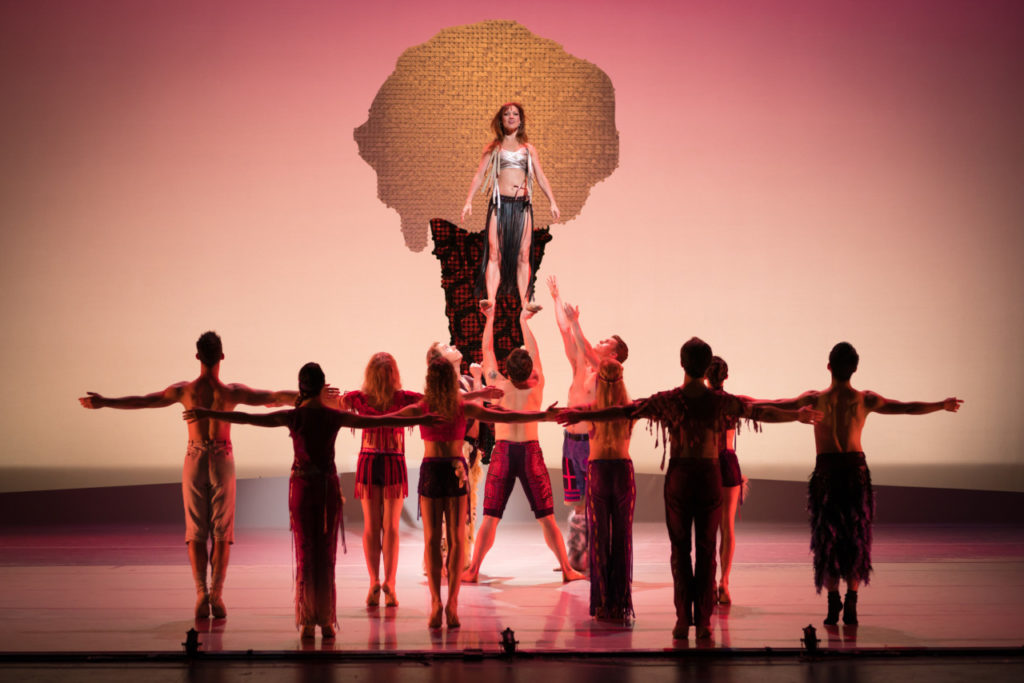
Smuin Contemporary American Ballet in Trey McIntyre’s ‘Be Here Now’ (Photo: Keith Sutter)
Was it only a year ago that Americans under the influence installed a con artist in the White House?
In a fortuitous snub to a new administration of Philistines, scores of dance artists occupied every nook and cranny of the iconic Grace Cathedral on the day of the 2017 presidential inauguration, igniting the San Francisco Movement Arts Festival. Days later, the smoldering Soledad Barrio held San Francisco spellbound with Noche Flamenca’s Antigone – a stinging “allegory of the power and the hazards of civil disobedience.”
Choreographers pulled no punches in the D.I.R.T. Festival of Dance in Revolt(ing) Times at San Francisco’s Dance Mission Theatre, taking aim at the new administration’s efforts to rollback Obamacare, environmental protection, and women’s rights. They continued to let off steam at the 10th annual Summer Performance Festival (SPF10), on matters from homelessness to political oppression in Iran and the objectification of women. The summer of hate was also the 50th anniversary of the Summer of Love, for which Trey McIntyre constructed the “exuberant and chilling” Be Here Now for the company now known as Smuin Contemporary American Ballet.
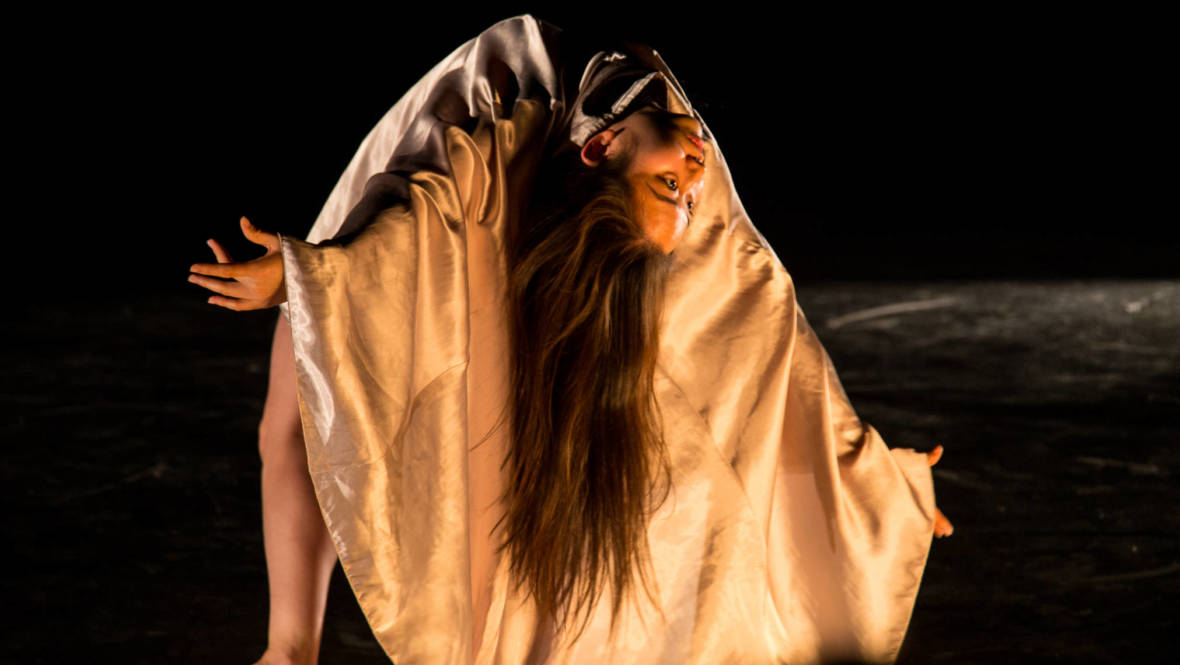
Lisa Kusanagi in ’16 Day Return Policy’ at the 2017 D.I.R.T. Festival (Photo: Victor Blanco)
Some adventurous new work commented more obliquely on modern times. These included Milissa Payne Bradley’s Enough Said, “a masterful two-part deployment of standup comedy as soundscape for ballet,” and Timothy O’Donnell’s heart-wrenching Sans Pleurer* for the men of Milwaukee Ballet. Equally unforgettable were Kyle Abraham’s Dearest Home and Graham Lustig’s witty Consort* for Oakland Ballet.
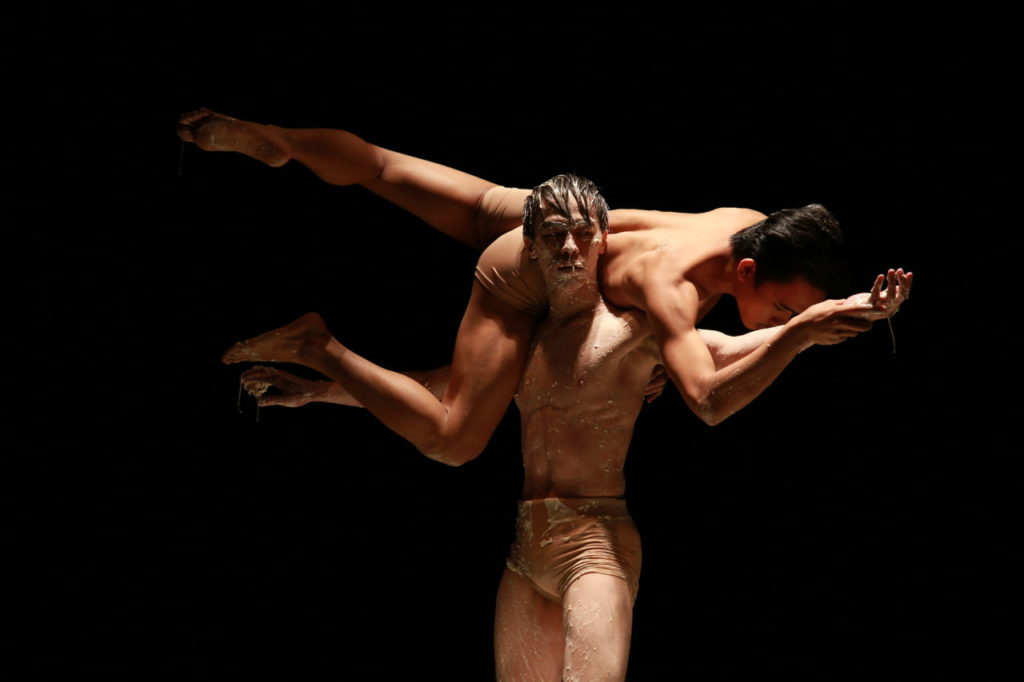
Sudhee Liao’s ‘Haptic Compression’ at the Hong Kong Arts Festival (Photo: Henry Wong)
Amid a stellar line-up of young Hong Kong choreographers* featured in 2017’s Contemporary Dance Series ‘Dance-Off’ at the Hong Kong Arts Festival, Along by Hugh Cho and Haptic Compression by Sudhee Liao proved the most striking. Provocative festival programming also paired Australian Stephanie Lake Company in the cerebral Dual with Turkish company Taldans in Dolap, the latter an exhilarating pas de trois for a man, a woman, and a battered old refrigerator.
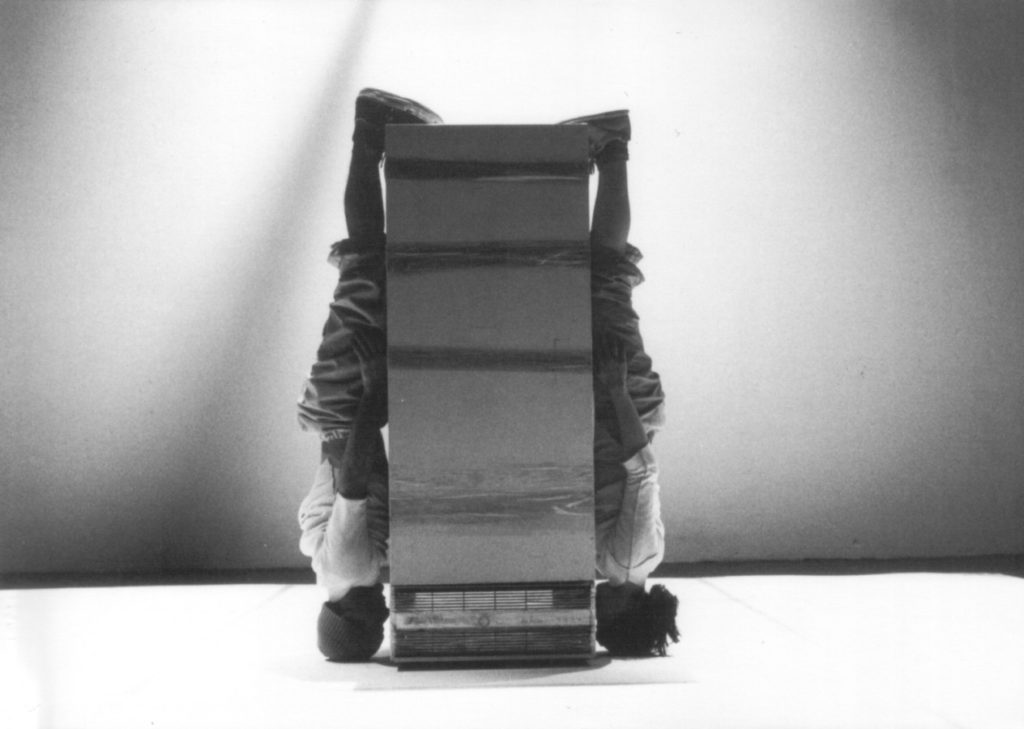
Taldans choreographer Mustafa Kaplan with Filiz Sizanli in ‘Dolap’ (Photo courtesy Taldans)
While discontent over the dearth of female choreographers resounded in public forums, Oregon Ballet Theatre was one of the few companies which actually did something about it. Three women in mid-career were commissioned to make work for a new program labeled ‘Choreography XX’; Helen Simoneau and Gioconda Barbuto delivered the goods.
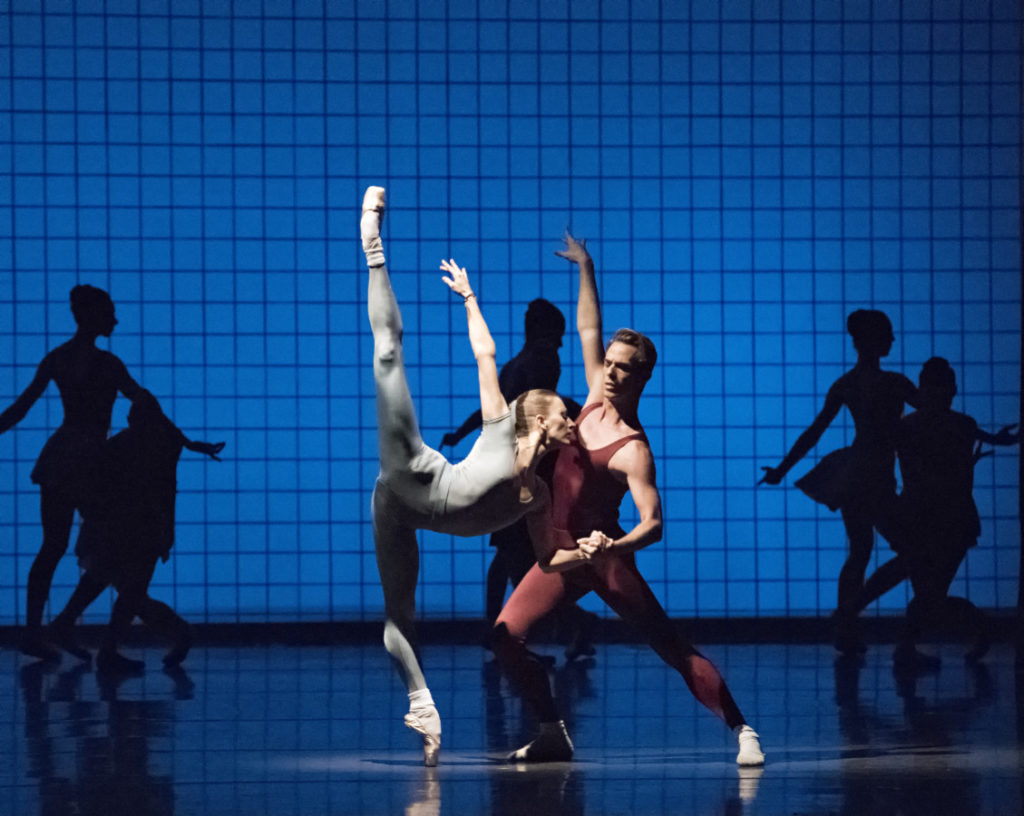
Miami City Ballet’s Simone Messmer and Rainer Krenstetter in Jerome Robbins’ ‘Glass Pieces’ (Photo: Gene Schiavone)
A diet of intrepid new work needs to be balanced with the tried and true. This past year there was no shortage of classic material lovingly burnished by Milwaukee Ballet (La Sylphide*), San Francisco Ballet (Helgi Tomasson’s Swan Lake* and William Forsythe’s Pas/Parts 2016*), Miami City Ballet (Balanchine’s Serenade, Robbins’ Glass Pieces, and Peter Martins’ Calcium Light Night*), Bayerisches Staatsballett II (Balanchine’s Allegro Brillante, Nacho Duato’s Jardi Tancat, and a heroic recreation of Oskar Schlemmer’s surreal Triadic Ballet), Paul Taylor Dance Company (Taylor’s timeless Airs and rocket-powered Syzygy*), Houston Ballet (Balanchine’s Symphony in C and Chris Wheeldon’s Carousel*) and Tanztheater Wuppertal (Pina Bausch’s Café Muller and Rite of Spring*.)
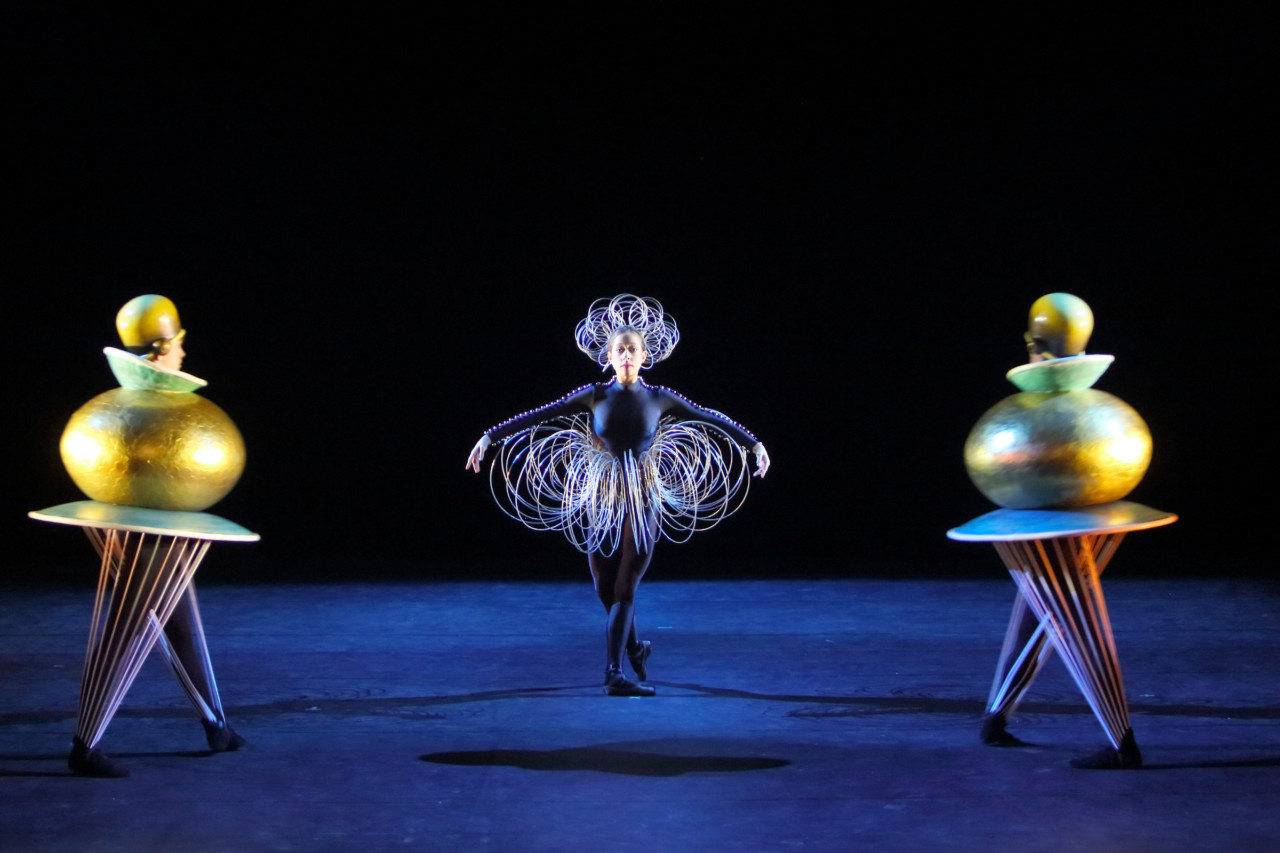
Alisa Bartels, Alexander Bennett, Nicholas Losada of Bayerisches Staatsballett II in a recreation of Oskar Schlemmer’s ‘Triadic Ballet,’ staged in 1977 by Gerhard Bohner and revived in 2014 by Ivan Liška and Colleen Scott (Photo: Wilfried Hösl)
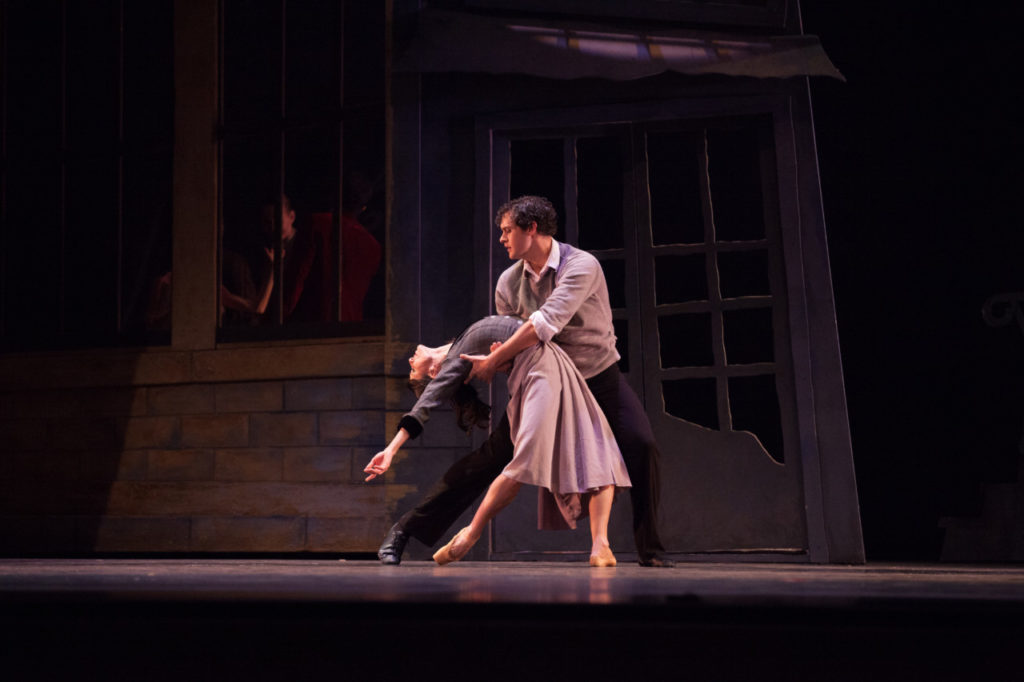
Luz San Miguel as Mimi and Timothy O’Donnell as Marcello in Michael Pink’s ‘La Bohème’ for Milwaukee Ballet. (Photo: Rachel Malehorn)
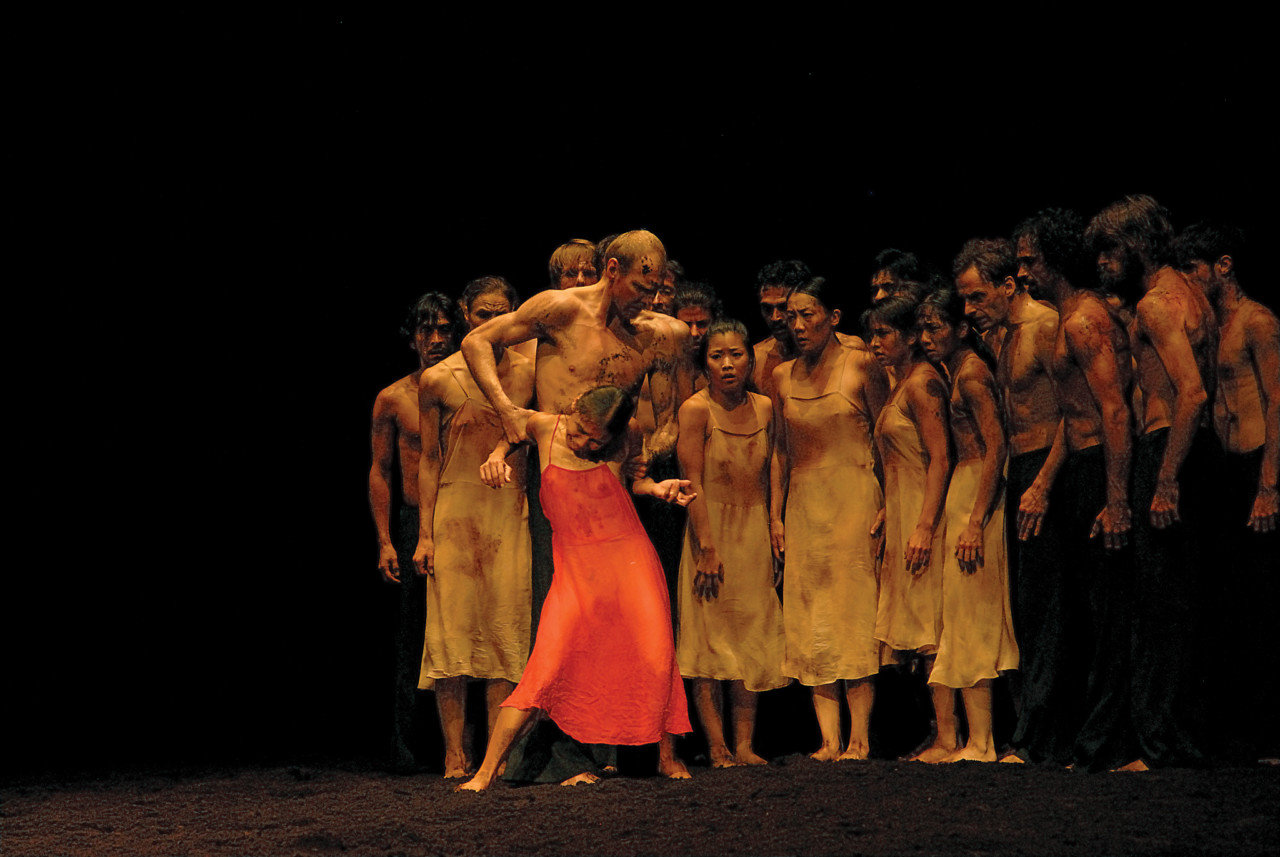
Tsai-wei Tien (The Chosen) at the mercy of Michael Strecker and the ensemble of Tanztheater Wuppertal in Pina Bausch’s ‘Sacre du Printemps (Rite of Spring)’ (Photo: Zerrin Aydin-Herwegh)
Destined to become classics were Annabelle Lopez Ochoa’s Streetcar Named Desire for the feisty Scottish Ballet, Michael Pink’s La Boheme* for Milwaukee Ballet, and Adonis Foniadakis’ spell-binding Kosmos* for Les Ballets Jazz de Montreal. Perhaps not destined to become a classic, Peter Martins’ Swan Lake* nevertheless delivers a stunning lakeside denouement and this past season was graced by a string of debuts from Megan Fairchild and Gonzalo Garcia, Tiler Peck and Chase Finlay.
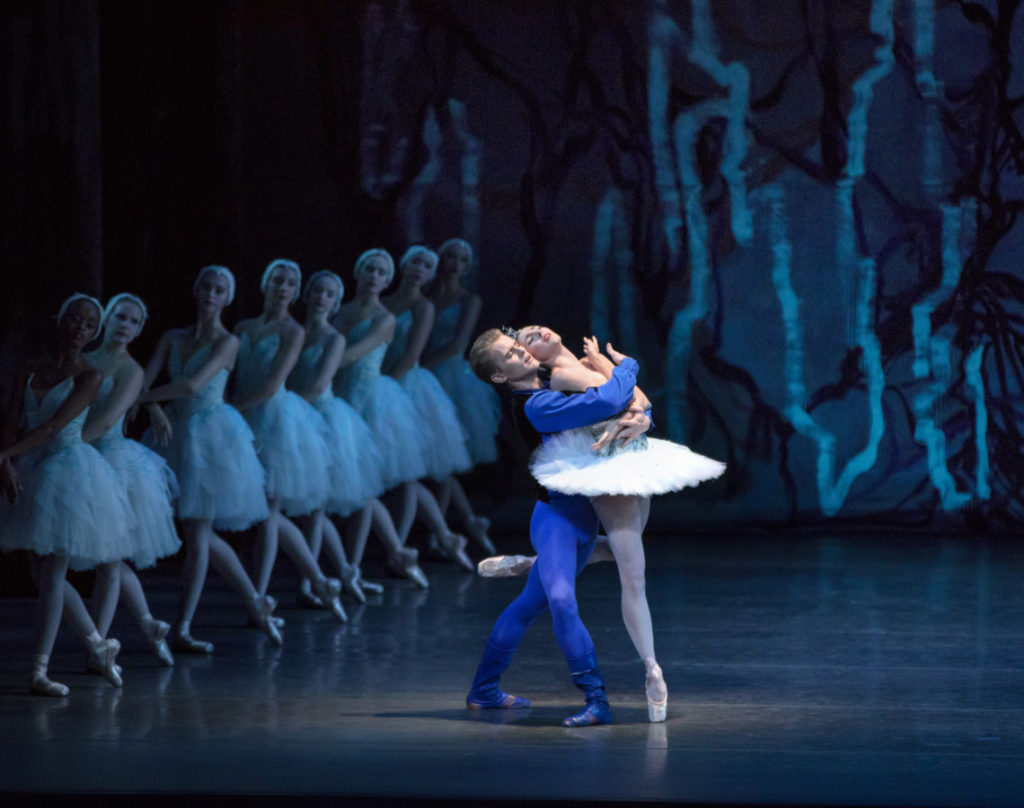
Tiler Peck as Odette and Chase Finlay as Prince Siegfried in Peter Martins’ ‘Swan Lake’ for New York City Ballet (Photo: Paul Kolnik)
Among the most imaginative takes on an old warhorse were Tomio Mohri’s inventions for Bayerisches Staatsballett’s Bayadère – “ravishing designs of Hindu, Japanese and Vietnamese inspiration, applied in spare, modernist style.” (Mohri is known for his stagings of fashion designer Issey Miyake’s work.) Costumes and painted drops offered ample compensation for the occasionally turgid choreography by Patrice Bart, who appears to have been heavily influenced by Nureyev’s production.
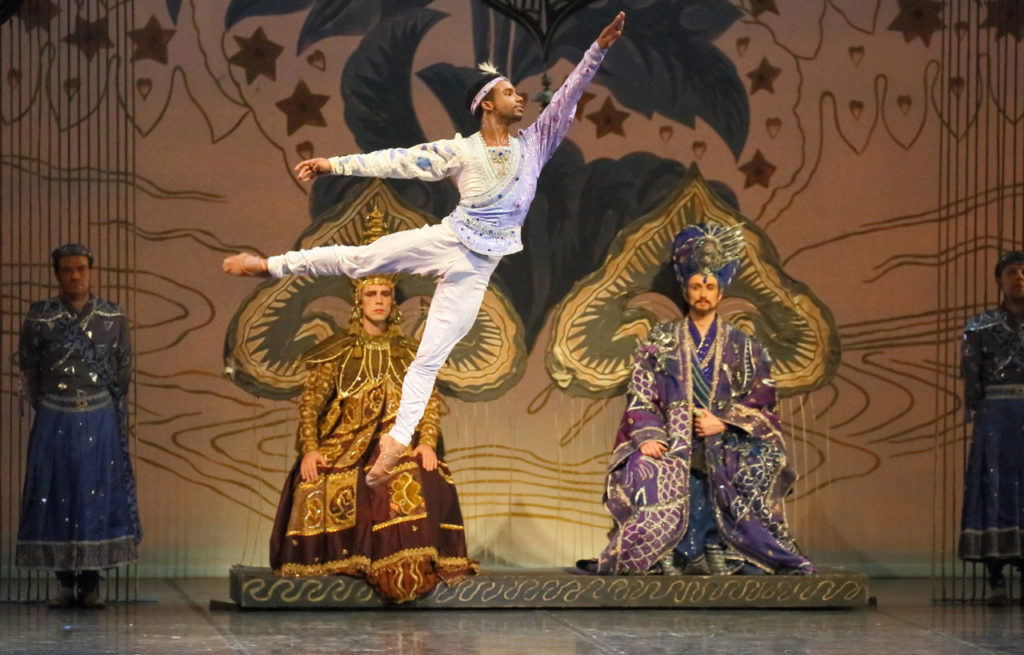
Osiel Gouneo of Bayerisches Staatsballett in Patrice Bart’s staging of ‘La Bayadère’ (Photo: W. Hösl)
Things that fizzled included Arthur Pita’s vision of Salomé*, which lost steam after a spectacular opening in which a stretch limousine rolled onstage and disgorged what could have been Trump père, first wife Ivana, and spoiled offspring Ivanka. Other non-events were Paul Taylor’s Open Door*, unworthy of its transcendent Elgar score, and a slew of busy world premieres at New York City Ballet’s Fall gala*. Hubbard Street Dance’s immersive work by Peter Chu (Space, In Perspective) was intriguingly conceived, passionately danced, but poorly engineered, with audiences scuttling in and out of tight spaces in Chicago’s Harris Theater.
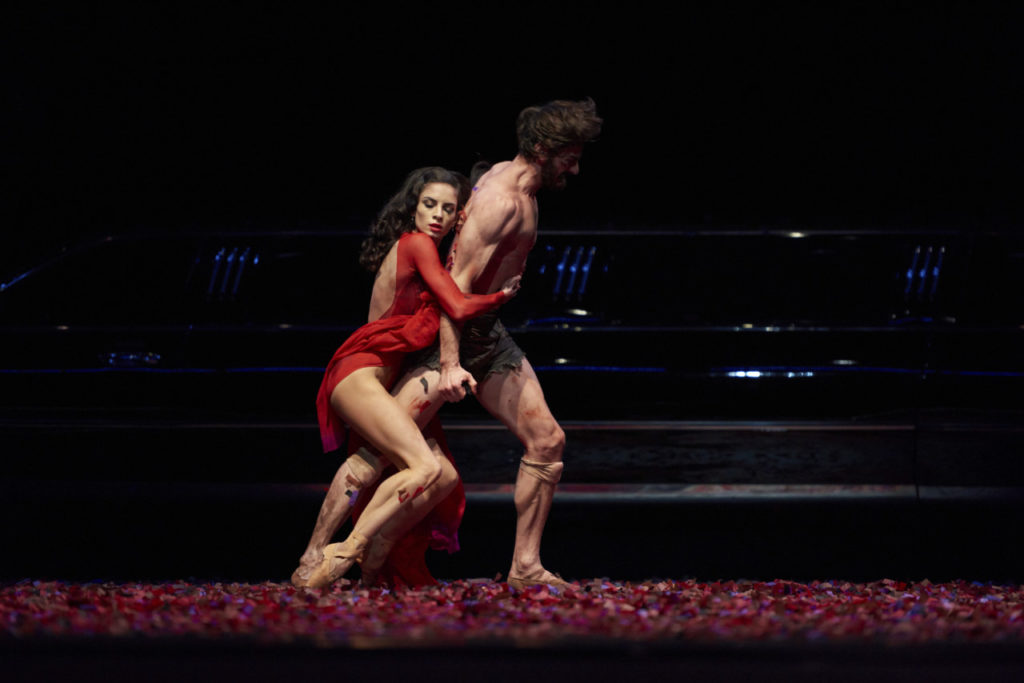
Aaron Robison as John doesn’t stand a chance against Dores André as Salomé in Arthur Pita’s ‘Salomé’ for San Francisco Ballet (Photo: Erik Tomasson)
As sometimes happens when choreographers fall for a towering score, Jiří Bubeníček’s intermittently captivating Fragile Vessels* for San Francisco Ballet was ultimately toppled by Rachmaninoff’s second piano concerto. Likewise, Alonzo King’s collaboration with slam poet Bob Holman, titled Figures of Speech, failed to do justice to the monumental soundtrack of poems recorded in languages that are dead or dying.
On the other hand, San Francisco Ballet’s resident choreographer Yuri Possokhov has a good thing going with composer Ilya Demutsky. But Possokhov’s take on a 1933 Soviet propagandist drama, Optimistic Tragedy*, evoked Jerome Robbins’ pessimistic comedy, On the Town – and not in a good way.
Curating mixed bills can be a minefield; when they fail, they can display crackerjack dancers in an unflattering light. The decidedly mixed bill brought by Ballets Jazz de Montreal* to the Hong Kong Arts Festival “supplied far too much of firecracker Celine Casson splayed in a stupefying variety of splits.”

Camille A Brown dancers in ‘BLACK GIRL: Linguistic Play’ (Photo: Christopher Duggan, courtesy Cal Performances)
One of the perks of the trade gives Ballet to the People license to shoot the breeze with some of the dance world’s most compelling figures and creative movers-and-shakers. This past year, she had the privilege of sitting down with Myles Thatcher of San Francisco Ballet; Timothy O’Donnell* of Milwaukee Ballet; Nicole Klaymoon, founder of Embodiment Project; and Robert Dekkers in the run-up to his riotous Rite of Spring* at Burning Man. She cornered Camille A. Brown in New York, at a time when the much-in-demand choreographer was juggling a new Broadway opening, a world premiere at the Kennedy Center, and the Berkeley opening of BLACK GIRL: Linguistic Play; Yayoi Kambara during rehearsal for her inaugural home season at ODC Theater; and Lauren Jonas, founder and artistic director of the small but mighty Diablo Ballet on the threshold of the company’s 24th season.
Opera succeeded in distracting Ballet to the People from her main beat this past year – notably, David Radok’s taut staging of Janáček’s Makropulos Case for the National Theatre Brno. She also got a behind-the-scenes look at the complicated logistics of shipping the brand-new Dream of the Red Chamber, brainchild of composer Bright Sheng and co-librettist David Henry Hwang, across the Pacific Ocean.
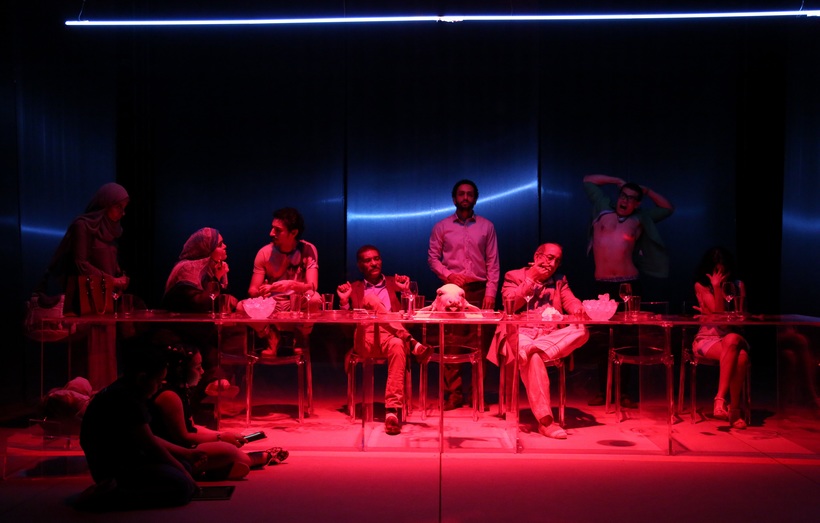
Ahmed El Attar’s ‘The Last Supper,’ set in Cairo in the immediate aftermath of the Arab Spring (Photo courtesy Hong Kong Arts Festival)
Theater provided yet another distraction. Most memorable was playwright’s Ahmed El Attar’s The Last Supper, a scandalous portrait of the Egyptian ruling elite. Though set in Cairo, “the vapid, often sexist and racist exchanges between the self-absorbed characters could have been recorded in any gold-plated dining room from Hong Kong to Mumbai, Manila, São Paulo, Capetown or Moscow – indeed, any city marked by a conspicuous class divide, whose economy is dominated by a few entrenched, inbred families.” The world may be shrinking, but crossing national borders remains as fraught as when travel was mostly undertaken by camel and galleon – this point was driven home with wit and muted outrage by Thaddeus Phillips in his virtuosic one-man work, 17 Border Crossings.
Movies were another draw. Ballet to the People caught up with Academy award-winning director Jeffrey Brown on the occasion of the digital release of SOLD, the film inspired by Patricia McCormick’s haunting account of a Nepali girl sold into sex slavery in India. She was moved by the way Filipino movie musical Ang Larawan (The Portrait) transcended its pre-World War II setting to probe the tangle of Filipino identity today. And she wandered the globe without leaving her living room, donning a VR headset for the first time, to spy on the dance world’s budding romance with VR technology.
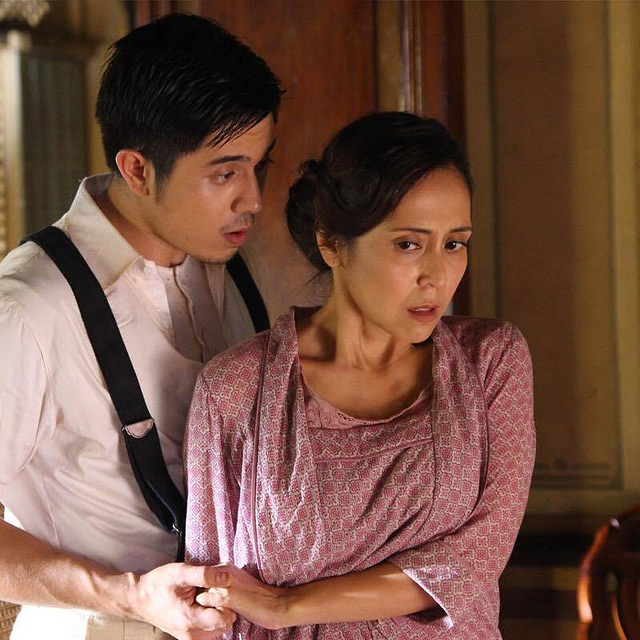
Paulo Avelino as Tony Javier seduces Rachel Alejandro as Paula Marasigan in ‘Ang Larawan (The Portrait),’ a musical film adaptation of Nick Joaquin’s ‘Portrait of the Artist as Filipino.’ Directed by Loy Arcenas, libretto by Rolando Tinio (Photo courtesy of the filmmakers)
Ballet to the People abandoned virtual reality for the glamorous reality of San Francisco Ballet’s 85th season gala, during which artistic director Helgi Tomasson announced that the “epicenter of the dance world will shift to San Francisco” in April, when the company unveils its ‘Unbound’ festival of new work by 12 renowned choreographers. The ballet world could use a fusillade of good news right now.
In the meantime, luggage in hand, Ballet to the People sprints for the train, headed for the 46th annual Hong Kong Arts Festival. Stay tuned!
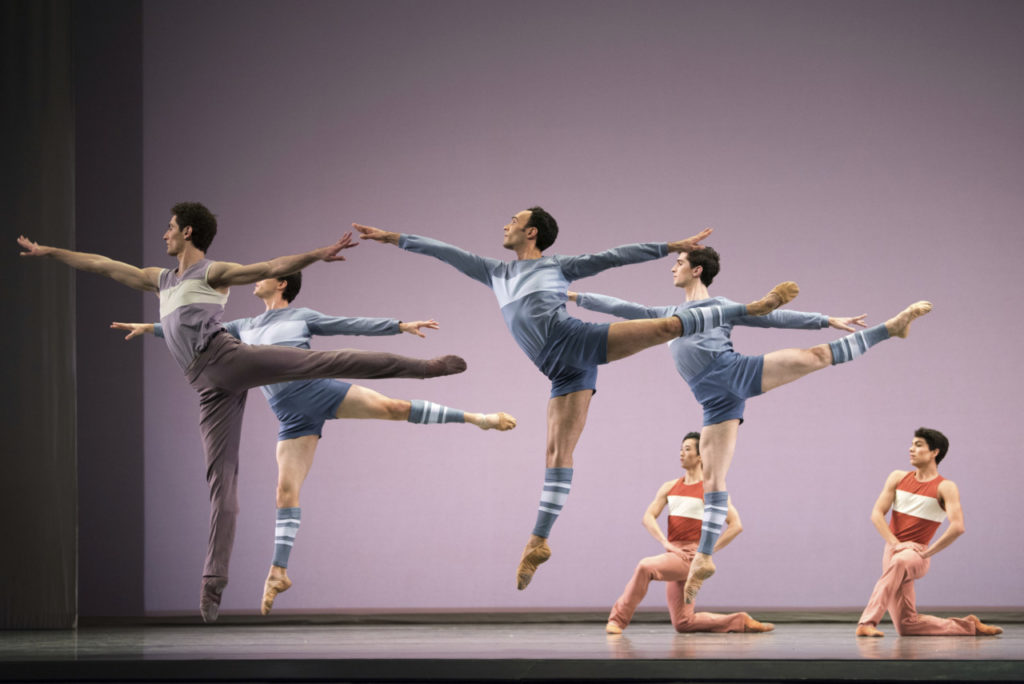
Carlo DiLanno, Esteban Hernandez, Jaime Garcia Castilla, Max Cauthorn, Wei Wang, Steven Morse of San Francisco Ballet in Justin Peck’s ‘Rodeo: Four Dance Episodes’ (Photo: Erik Tomasson)
*Reviews and interviews marked with an asterisk were published in Dance Europe magazine, which is behind a paywall. Individual issues (print and/or digital editions) and subscriptions are available for purchase online.
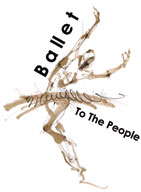
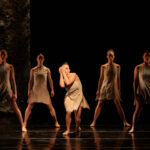



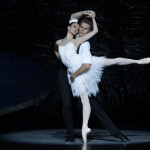
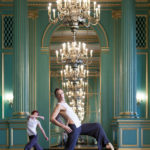
Oh, and I shoulda mentioned… HAMILTON!
wow & double wow!
A colorful, broad wake trailing a fantastic year !